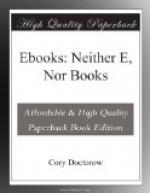Right as bookwarez newgroups were taking off, I was shocked silly by legal action by one of my colleagues against AOL/Time-Warner for carrying the alt.binaries.ebooks newsgroup. This writer alleged that AOL should have a duty to remove this newsgroup, since it carried so many infringing files, and that its failure to do so made it a contributory infringer, and so liable for the incredibly stiff penalties afforded by our newly minted copyright laws like the No Electronic Theft Act and the loathsome Digital Millennium Copyright Act or DMCA.
Now there was a scary thought: there were people out there who thought the world would be a better place if ISPs were given the duty of actively policing and censoring the websites and newsfeeds their customers had access to, including a requirement that ISPs needed to determine, all on their own, what was an unlawful copyright infringement — something more usually left up to judges in the light of extensive amicus briefings from esteemed copyright scholars [WIND DONE GONE GRAPHIC].
This was a stupendously dumb idea, and it offended me down to my boots. Writers are supposed to be advocates of free expression, not censorship. It seemed that some of my colleagues loved the First Amendment, but they were reluctant to share it with the rest of the world.
Well, dammit, I had a book coming out, and it seemed to be an opportunity to try to figure out a little more about this ebook stuff. On the one hand, ebooks were a dismal failure. On the other hand, there were more books posted to alt.binaries.ebooks every day.
This leads me into the two certainties I have about ebooks:
1. More people are reading more words off more screens every day [GRAPHIC]
2. Fewer people are reading fewer words off fewer pages every day [GRAPHIC]
These two certainties begged a lot of questions.
[CHART: EBOOK FAILINGS]
* Screen resolutions are too low to effectively replace paper
* People want to own physical books because of their visceral appeal (often this is accompanied by a little sermonette on how good books smell, or how good they look on a bookshelf, or how evocative an old curry stain in the margin can be)
* You can’t take your ebook into the tub
* You can’t read an ebook without power and a computer
* File-formats go obsolete, paper has lasted for a long time
None of these seemed like very good explanations for the “failure” of ebooks to me. If screen resolutions are too low to replace paper, then how come everyone I know spends more time reading off a screen every year, up to and including my sainted grandmother (geeks have a really crappy tendency to argue that certain technologies aren’t ready for primetime because their grandmothers won’t use them — well, my grandmother sends me email all the time. She types 70 words per minute, and loves to show off grandsonular email to her pals around the pool at her Florida retirement condo)?




